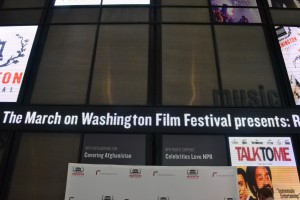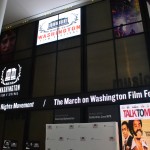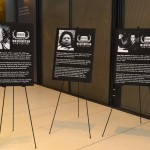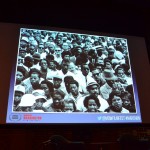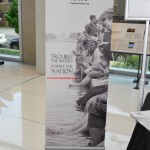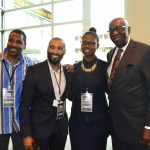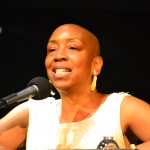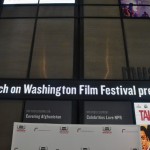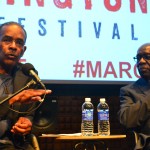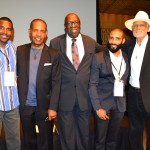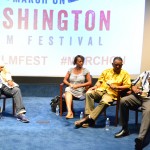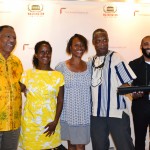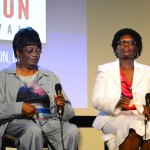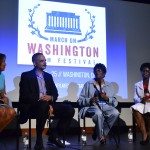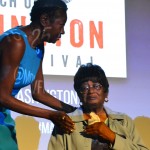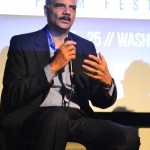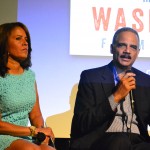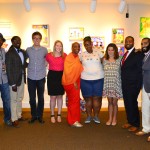MARCH ON WASHINGTON FILM FESTIVAL
Quiet on the Set Magazine has been busy making the rounds of countless film festivals across the country. One of the most impressive by far was the March on Washington Film Festival (MOWFF). The March on Washington Film Festival, a production of The Raben Group, strives to increase awareness of the events and heroes of the Civil Rights Era and inspire renewed passion for activism. The festival uses the power of film, music, and the arts to achieve this goal.
The March on Washington Film Festival started three years ago and was the brainchild of Robert Raben, who is not only the founder of the March on Washington Film Festival, but also the president and founder of the Raben Group which produces the Film Festival. Three years ago was the 50th anniversary of the March on Washington, hence the name.
This year, The March on Washington Film Festival held 12 events over 10 days in Washington D.C., with a host of writers, scholars, and civil rights icons who came to speak. There was Claudette Colvin, an original bus boycotter, Mary Liuzzo Lilleboe, the daughter of one of the only white women to be killed in the civil rights movement after the Selma march, Sarah Collins Rudolph, the only survivor of the 16th street Baptist Church bombing of (Four Little Girls), and former Attorney General Eric Holder, just to name a few. The ability to bring together foot soldiers and feature stories with film and music is not an easy thing to do, but they did it, and they did it well.
One of the secondary goals of the film festival was to influence the way civil rights are taught, and to encourage people to be engaged in civil rights issues. In January, the film festival partnered with Selma for Students to fundraise over $12,000 to send over 10,000 students to see the film “Selma”.
There was also a “family” component to the festival this year. Historic civil rights icons had their children discuss what it meant to be a “child of the movement”. Dick Gregory’s daughter Ayanna Gregory was a great person to tell that story, which she did so eloquently through a captivating performance of dance, song, and spoken word. While in Selma for the 50th Anniversary March she spoke and sang along with her father. It was a compelling moment giving us a rare snapshot of history that not a lot of people get to witness. It is important to hear about the sacrifices, but to also realize that those sacrifices were worth it, is just as important.
Filmmaker Keith Beauchamp, the director behind the film “The Untold Story of Emmett Louis Till” about the slain Chicago teen Emmett Till, was also in attendance. Beauchamp is involved in other film work but credits the “Untold Story” with occupying and shaping his life in a major way. He credits his relationship with Mamie Till, Emmett mother’s, with inspiring him to create the film. His story was featured in various television shows including “60 Minutes” with Ed Bradley.
Also, radio and television in the civil rights movement isn’t something we necessarily think about when we think of the role of media. However, radio was intricately involved as a part of the time. That was one of the major ways a lot of people still got their news. Consequently, a lot of people don’t know about Dr. Shelly Stewart, Joe Madison, and Petey Greene, and the roles they played in bringing awareness to the causes of the day. There was a panel discussion which featured these radio icons along with a screening of the 2007 film “Talk to Me” starring Don Cheadle and Taraji P. Henson, based on the life of Petey Greene. Dewey Hughes (on whom the film was also partially based) was in attendance, while Cathy Hughes of “TV One” and “Radio One” fame spoke on the panel. It was an extraordinary event of information, history, and storytelling that people didn’t know.
The March on Washington Film Festival closed at the Supreme Court in a conversation about freedom and the law, which included discussions about Justices Thurgood Marshall and Constance Baker Motley, along with the screening of the film The Trials of Constance Baker Motley. That was a great way to ground the film festival in the legal work that was so intricately involved in propelling the Civil Rights movement forward. With everything that’s going on right now, one of the goals of the festival was to allow children, adults, young and old, the opportunity to ask the hard questions and to have hard conversations about race and rights. It seems to be a little bit easier to do it over a film, a conversation, or a performance.
Quiet on the Set Magazine was honored to have been invited to participate in The March on Washington Film Festival. We made some good friends and planted seeds for some lasting relationships, all while experiencing history in the making. We are already looking forward to attending the 2016 festival next year.
Take a look at some of the people we met, films we saw, and experiences we had while at the 2015 March on Washington Film Festival.

